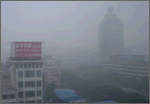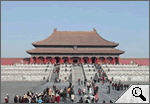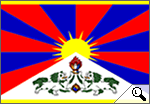|
|
|
|
 |
 |
 > The World's Fourth Economy > Imbalances > Lack of Freedoms dijous, 13 de setembre de 2007
China is the world's fourth largest country after Russia, Canada and the United States and the world's most densely populated with 1.32 billion inhabitants, almost a fifth of the total population of the planet.
Formally a communist country, in 1977 China embarked on a series of economic reforms introduced by Deng Xiaoping, successor to the historic Chinese leader Mao Zedong. Since then, the country's economic reforms have been consolidated, with the progressive introduction of the capitalist system. Today China is one of the world's leading economic powers and plays an increasingly visible role in international affairs. Two forthcoming events symbolise the new power of the Chinese: the Beijing Olympics in 2008 and the World Expo in Shanghai in 2010. However, it should be said that China's economic reforms have not been accompanied by moves towards democracy. The lack of freedom is continually condemned by human rights organisations, more so than by the leading democratic powers which adopt a more cautious approach towards China.
The World's Fourth EconomyChina is the fourth largest economy in the world, behind only the United States, Japan and Germany. What's more, it has annual growth that comfortably exceeds 10%, which one of the most remarkable growth figures in the world. China's eastern coastal cities have been the main beneficiaries of this spectacular growth, symbolised by the proliferation of skyscrapers and a modern lifestyle that is similar to large western cities. This Asian country is also one of the world's leading exporters: 21% of its exports are destined for the United States, the world's leading economic power.
Imbalances
+ China's growth has been at the cost of a significant deterioration in the environment.
In spite of this, socioeconomic reality in China is one of significant imbalances. There exists a great disparity between urban and rural areas, between coastal cities and those found inland, which are far less developed. Furthermore, China's phenomenal economic development has been at the cost of a significant deterioration in the environment. In percentage terms, China is second in carbon dioxide emissions (the United States is first) with twenty of the world's thirty most contaminating cities being in China.
Lack of FreedomsA major part of China's environmental problems can be explained by the absence of democracy, along with a high level of corruption. The world's largest political party, the Chinese Communist Party, also rules the country with a rod of iron. Individual and collective freedoms are violated, as in the case of Tibet, occupied by China since 1950. The Tibetan cause has resonated strongly in the West, due mainly to the figure of the Dalai Lama (Tibet's spiritual leader), Tenzin Gyatso, who has visited Barcelona in recent days.
|
Investiga


> Informe de Human Rights Watch sobre els drets humans a la Xina.

> Cop d'ull a l'exili tibetà.

> Sobre el confucianisme, doctrina que ha marcat la vida xinesa durant segles.
I també...
- La Xina actual, per temes.
- Vistes panoràmiques de la Gran Muralla de la Xina, una de les set noves meravelles del món.
Portada |
Europa Press |
El Punt |
La premsa |
Especials |
Diari de l'escola |
LesFinances.info |
Editorials |
Mail obert |
Els blocs |
Lletres
Tecnologia i ciència | Solidaritat | Cap de 7mana | Campus | El 9 | Presència | Fòrums | Enquestes | Xat | Correu
Traductor | Edicions en Pdf | Wap-pda | Biblioteca | Lletra més grossa
Tecnologia i ciència | Solidaritat | Cap de 7mana | Campus | El 9 | Presència | Fòrums | Enquestes | Xat | Correu
Traductor | Edicions en Pdf | Wap-pda | Biblioteca | Lletra més grossa
| Què és VilaWeb? Publicitat Mapa web Contacte | Una web de Partal, Maresma i Associats, S.L. |



